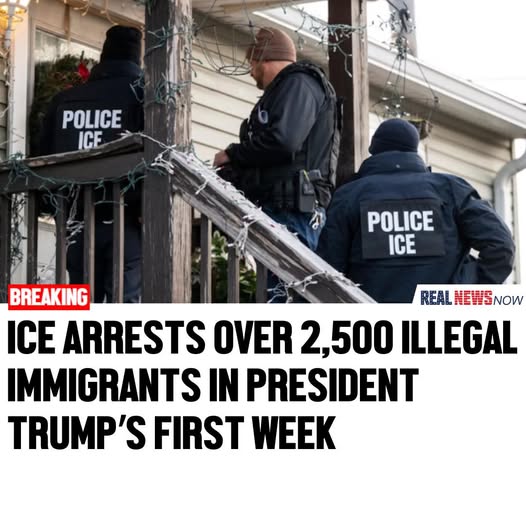ICE Arrests Over 2,500 Illegal Immigrants in President Trump’s First Week
In the first week after President Donald Trump’s inauguration, U.S. Immigration and Customs Enforcement (ICE), under the leadership of Border Czar Tom Homan, conducted a sweeping operation that resulted in the arrest of over 2,500 individuals living illegally in the United States. These raids, which took place across the country, were primarily focused on individuals with criminal convictions, especially those considered to be a threat to public safety. This aggressive approach signaled the Trump administration’s commitment to intensifying immigration enforcement, particularly targeting people who were in the country without legal authorization and had been involved in criminal activity.
The operations spanned numerous cities, including those known for their sanctuary policies, such as Chicago and Los Angeles. Sanctuary cities are jurisdictions that limit cooperation with federal immigration authorities, often by refusing to detain individuals solely based on their immigration status. As a result, ICE faced challenges in these areas, but the raids continued as part of the administration’s broader strategy to address what it viewed as a national security threat posed by illegal immigration. ICE emphasized that the operations targeted individuals who had prior criminal convictions, including those involved in violent offenses like assault and drug trafficking.
In addition to focusing on criminal immigrants, ICE also detained other individuals encountered during the raids who were found to be living in the country illegally. These individuals, although not the primary targets of the operations, were taken into custody as part of ICE’s broader mandate to enforce immigration laws. The agency collaborated with other federal entities, such as the Drug Enforcement Administration (DEA), to further strengthen the reach of these operations. For instance, in Colorado, the DEA arrested individuals connected to a Venezuelan gang that had been operating in the area, highlighting the intersection of illegal immigration and organized crime.
The U.S. military also played a role in supporting immigration enforcement efforts. Both the U.S. Marine Corps and the Coast Guard were involved in various initiatives designed to prevent illegal border crossings and disrupt the activities of human traffickers and drug smugglers. The military’s involvement marked a significant escalation in the use of federal resources to address border security issues, reflecting the administration’s hardline stance on immigration enforcement.
One of the more high-profile aspects of these ICE operations was the involvement of public figures, including television personality Dr. Phil McGraw. Dr. Phil, known for his popular daytime talk show, joined ICE agents in Chicago to help raise awareness about the challenges posed by sanctuary cities. His participation was part of a broader public relations campaign aimed at galvanizing public support for the administration’s tough approach to immigration and its focus on law and order.
These early actions were in line with President Trump’s executive orders, which directed federal agencies to prioritize the removal of individuals with criminal backgrounds and to broaden enforcement efforts across the country. The administration made it clear that it intended to follow through on its campaign promises to crack down on illegal immigration, especially among those who had been involved in criminal activity. The president argued that such actions were necessary to ensure the safety and security of American citizens.
ICE’s activities during the first week of the Trump administration were part of a broader effort to fulfill the president’s promises on immigration and border security. The raids were seen by many as a decisive move to dismantle illegal immigration networks, disrupt criminal enterprises, and reclaim control over the nation’s borders. However, critics of the policy argued that the focus on deporting individuals with criminal records could create fear and anxiety in immigrant communities, particularly those in sanctuary cities where residents often view federal immigration laws as being unfairly punitive.
While the Trump administration’s hardline approach to immigration enforcement was met with praise by supporters who saw it as a necessary step toward national security, it also sparked protests and legal challenges, particularly from cities and states that opposed the administration’s policies. The controversy surrounding the raids highlighted the deep divide in the U.S. over how to balance immigration enforcement with human rights concerns.
In conclusion, the first week of President Trump’s administration saw a sharp increase in immigration enforcement under ICE, focusing on individuals with criminal convictions. These nationwide raids, which targeted sanctuary cities and involved a range of federal agencies, reflected the administration’s commitment to enforcing immigration laws and enhancing national security. While the actions were praised by some for their focus on public safety, they also generated significant opposition, particularly from communities that felt the policies were overly punitive.





